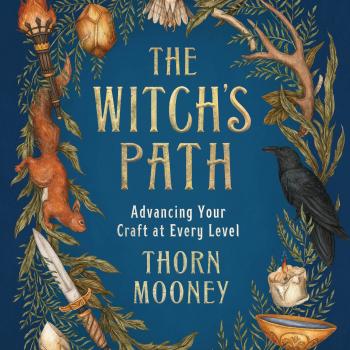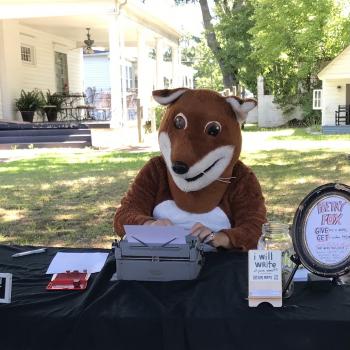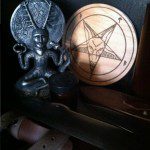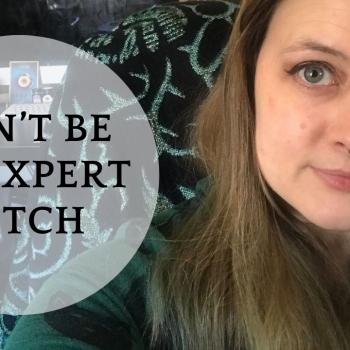I don’t write very much about my personal life on any of my blogs. It also doesn’t come up all that frequently on YouTube or Twitter. It’s a weird line between being very public and very private and there’s always some negotiating that has to be done. What do I share? What do people even want to know? What could impact my jobs? My relationships? What’s going to be left in twenty years? When I’m dead?
Like a lot of witches, I live a double life.
Maybe more than that.
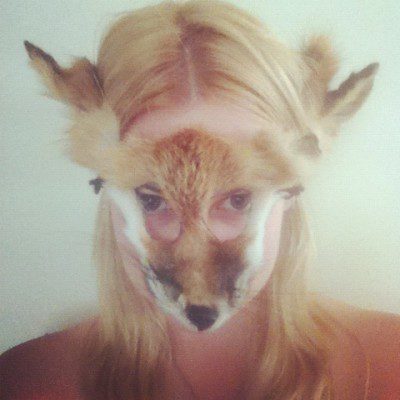
We often speak in terms of being “in” or “out” as a witch, but it’s more complicated than that. Most of us are secretive with some people and open with others, as we would be regarding any kind of intimate information about ourselves. My boss knows about my work life but not my romantic life. My mom knows about my school life but not my coven life. My close friends know about my personal life, but not my work life. Everyone is compartmentalized to some extent, I think. It’s not a question of pride or shame, but rather of practicality, privacy, and appropriateness. No one person gets every side of me, and most people only get one or two.
I recently found myself in a bizarre position, reading tarot cards at a witch shop and teaching guitar at the music school right next door. A hallway divided the two spaces, and advertisements for both businesses faced each other on opposing side. I had a framed profile on the music side—a picture of me playing onstage and a teacher biography—complete with the name I was born with. On the opposite wall, another advertisement—me holding a deck of cards, and a note about an upcoming tarot class—emblazoned with the name I chose for myself. People could piece things together if they were inclined to do so, but it never came up.
Standing in that hallway could be truly surreal.
They’re like different people I’ve crafted, and I wear one or the other depending on where I am and who I’m with.
It’s not a simple question of being in or out.
Sometimes, one identity has greater prominence than the other. In various settings, one serves me better than the other. In Craft settings, I’m Thorn. When people use my birth name, it feels jarring and out of place. Elsewhere, no one knows that Thorn exists. Not because she’s a secret, exactly, but because she doesn’t have context.
I could tell my parents about being Wiccan (and it’s not that they don’t know, exactly), but I couldn’t convey the weight of my involvement in a tradition or a coven because we have no analogues or cognates. I could talk about witchcraft at work, but why would I? I keep quiet, but it’s not out of fear. It’s because that’s not the matter at hand, and I don’t want to hear about anyone else’s religious life anymore than I want to talk about my own. I’m only there to work.
The first time I read Triumph of the Moon, I was struck by something Hutton wrote about Dorothy Clutterbuck while piecing together her life from various records and accounts (and I’m paraphrasing here from memory): if we take these things to be true—that she was the prominent witch that Gardner and others claimed and also the community pillar, with family and associates unable to corroborate anything out of the ordinary—she must have lived an astounding double life.
Not to say that I don’t agree with Hutton’s assessment or conclusions, but people can be very complicated. And it’s not so hard to believe that a husband or parent might be oblivious. Or that one couldn’t be a public, respected figure, and also a secret witch, with colleagues, bosses, and other associates none the wiser. It’s not impossible, if my own life is any indication.
Sometimes I fantasize about my house being ransacked by friends and family, dividing my things after I’ve died. I laugh when I think about certain people rummaging through certain drawers, finding mysterious objects (GROSS WHAT’S IN THIS JAR), or reading things in certain notebooks. Everyone—from siblings to covenmates—would find something surprising. I think that’s probably true about all of us, on some level. I just happen to be a witch (among other things).
In some spaces, there’s pressure to be either in or out. We do it to ourselves, or prominent members of our communities insist that it’s some kind of social responsibility: we have to be represented, we have to be honest, be counted. I think that’s a limited perspective, given the above. We can’t be all in or all out. Even if I’m public about owning certain identities, the specifics are never universal. If I tell you I’m a Wiccan—or even a Gardnerian Wiccan—you only have a loose framework for what that means, and you may not have the right one. Even people in the same covens often have different experiences and perspectives. We all go home to different kinds of lives.
I’m not particularly troubled about it all. Standing in that hallway, with my two names on either side of me, I like to be reminded how strange and complex we all are. You can never really know someone completely. Some people would say this is dishonesty at work, or that it can only lead to identity crisis, but I think it’s exciting. It’s good to be reminded that people can surprise you, and that sometimes you can have the chance to craft (Craft) new versions of yourself.






